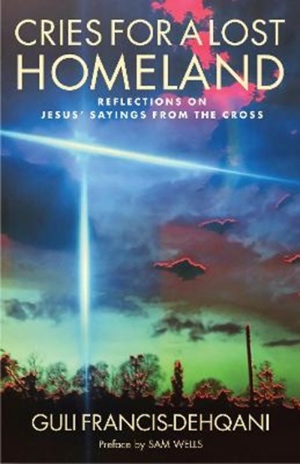Cries for a Lost Homeland by Guli Francis-Dehqani
These reflections from the new Bishop of Chelmsford, written in the context of her brother's murder, contain so much on which we may and indeed should ponder
 Cries for a Lost Homeland: Reflections on Jesus’ Sayings from the Cross
Cries for a Lost Homeland: Reflections on Jesus’ Sayings from the Cross
By Guli Francis-Dehqani
Canterbury Press
ISBN: 9781786223838
Reviewed by Paul Beasley Murray
Cries for a Lost Homeland is strikingly different from other books on Jesus’ last seven ‘words’, for the new Bishop of Chelmsford is writing from her experience of having to flee with her parents from Iran at the age of 14 after her brother had been murdered. It is within the context of her own story that she approaches the Cross.
Borrowing words from Annette Simmons, she writes, 'My hope is that by talking about my stories, you will start thinking about your stories….. Go tell your story; the world needs it.'
Although there were times when I questioned some of her exegesis, I was nonetheless overwhelmed by the potency of her exposition. Thus commenting on Jesus’ prayer, “Father forgive”, she writes from within her own experience of pain: 'Forgiveness is less a point of arrival at some clearly defined destination and more of a messy voyage – the ultimate expedition – and undertaken in faith, knowing that we may stumble, fall and fail over and over again.'
Within the context of her brother’s murder, she makes a point which had never occurred to me before: 'The loss caused us terrible pain, but was it our role to forgive his murderers? Did we even have the right to do this on his behalf? Moreover, is forgiveness ever ours to offer, or does it belong to God? Neither St Stephen as he was being stoned, nor Jesus from the cross, said ‘I forgive’. Their cry is ‘Father, forgive….’.'
I was also struck by her unusual exposition of the words of Jesus to Mary and then to John, 'Here is your son… here is your mother' which she interprets in terms of identity: 'Jesus loosens the bonds of their familial ties, lightens the weight of their histories and eases the stranglehold of the stories that had brought each of them to this place. He gives permission for a new future and points them towards a new way of belonging….. less concerned with tradition and history and individuality and more concerned with exploration, connectedness and community.'
These reflections contain so much on which we may and indeed should ponder. I warmly commend this book not just to ministers but to any follower of Jesus.
Baptist minister Paul Beasley-Murray was ordained in 1970. His recent book Fifty Lessons in Ministry: Reflections after Fifty Years in Ministry was published by Darton, Longman and Todd
Baptist Times, 15/10/2021